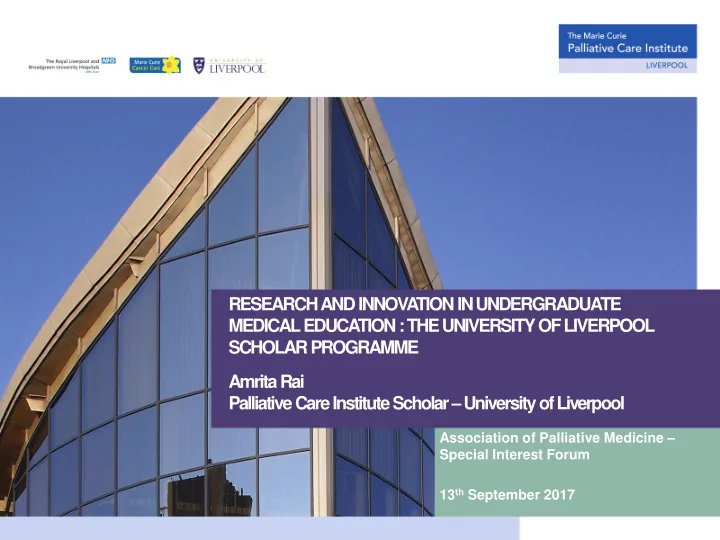

RESEARCH AND INNOV A TION IN UNDERGRADUA TE MEDICAL EDUCA TION : THE UNIVERSITY OFLIVERPOOL SCHOLAR PROGRAMME Amrita Rai Palliative Care Institute Scholar – University of Liverpool Association of Palliative Medicine – Special Interest Forum 13 th September 2017
Undergraduate Medical Students and Clinical Research “Outcomes Graduates” for identifies that medical students should understand the value of research, and be able to: “Formulate simple relevant research questions… ...and design appropriate studies or experiments to address the questions” (Section 12b) Being involved in research at an early stage in their career has been shown to enhance critical thinking skills and efficiency in aggregating relevant subject information from current research ( Gonzales. Family Medicine 1998 ).
Access to Research Skills • As Core Curricula, students learn how research established evidence base guides clinical practice. • However, many are unsure as to how they can get involved in clinical research. • As a consequence, many medical graduates are “underprepared for doing postgraduate research”(2) and “few go on to further academic training”( Burgoyne - Med Edu 2010; Kasivisvanathan - BMJ, 2015 ).
The Scholar Programme at the University of Liverpool. • The Scholar Programme aims to: – accelerate the development of research skills by embedding medical students within an active clinical research department at early stage in their education. • This gives “scholars” first -hand experience in the development and application of clinical research. • The programme also provides opportunities for scholars to develop their own research study, participate in peer mentoring and bridges the gap between research and clinical practice.
Scholar Programme Options • Musculoskeletal Biology and Medicine • Infection and Global Health NIHR CLARHR NWC • Complex obstetrics • Reducing mortality and morbidity from postpartum haemorrhage in Uganda • Haemato-oncology • Head and Neck Oncology Research • Neurodevelopmental Paediatrics • Paediatric Respiratory Medicine • Specialist Palliative Medicine • Translational Gastroenterology
So why apply? What are the opportunities? To make connections with experts and To explore academic healthcare medicine as a professionals in your potential career fields of interest Develop extended knowledge of one area of practice To improve CV – i.e. Extra work abstracts and experience publications placements
Programme outline
Examples of outputs from the programme • Mobbs N, Ditai J, Abeso J, Faragher B, Carrol E, Gladstone M, Medina-Lara A, Olupot-Olupot P, Weeks A . In search of a primary outcome for community-based newborn infection trials in Eastern Uganda: a cohort study. Trials (in development) • Harrison B, Ogara C, Gladstone M, Carrol ED, Dusabe-Richards J, Medina- Lara A, Ditai J, Weeks A. “We have to clean ourselves to ensure that our children are healthy and beautiful”: a qualitative assessment of a new educational poster on Newborn Moments for Hand Hygiene in the Home. BMC Public Health (in development) • Robinson T. An Audit of the Medical Examination and Investigation for Children with Autism Spectrum Disorder (ASD) in Merseyside - BACCH Annual Scientific Meeting, London 2017 • Pieri B, Taylor DCM. Stress and anxiety in second and third year medical students during a period of curriculum change . AMEE 2017 • Cassidy D, Mayland C, Mason S. Dignity for the dying: evaluating the feasibility of engaging the “Patient Dignity Question” within an Academic Palliative Care Unit . APM, Belfst 2017 • Bains S, Rai A, Cassidy D, Nwosu AC, Ellershaw JE, Mason. The University of Liverpool Scholar Programme: an opportunity to develop clinical academics within undergraduate training . AMEE , Helsinki 2017.
Students’ experience of the programme ‘’Since joining the programme I have been afforded some superb opportunities taking part in cutting-edge medical research . This includes carrying out joint research in Uganda and the option to visit and partake in work experience’’ - BW, 3rd Year Medical Student ‘’I joined the Scholar Programme in its inaugural year. My research has been focused on the comorbidities associated with Chronic Lymphocytic Leukaemia and the ways in which comorbid factors impact upon treatment decisions and outcomes for patients. I am now in the process of taking this work forward with a view to publishing my findings into the BMJ’’ - AB, 4th Year Medical Student ‘ ’The Scholar Programme has aided my sense of curiosity and understanding of medical research. I have been able to collaborate on topical research subjects, allowing me to observe how major organisations such as World Health Organisation (WHO) operate on health and disease management. The programme has also widened my understanding of the arduous process requiring great teamwork, collaboration and effort to synthesise a single scientific research paper’’ - PR, 3rd Year Medical Student
Palliative Care Scholars • David Cassidy - 4 th Year • Promoting dignity and patient-centred care within an Academic Palliative Care Unit : a feasibility study. • Sumandeep Baines - 3 rd Year • The association of reduced oral fluid intake with clinical variables in advanced cancer: a secondary analysis of observational data . • Amrita Rai - 3 rd Year • The development and evaluation of an electronic assessment tool to examine the impact of undergraduate training in palliative medicine.
Conclusion 1. Scholars have found they have benefitted tremendously from participating in the Scholar Programme, citing the opportunity to observe and understand the development and complexity of the research process, and through their own project, apply their learning . 2. The Scholar Programme has not only increased Scholar students understanding of how research is conducted , but has also given students more opportunities in specialised areas – such as palliative care . 3. The scholarship programme provides key skills which are translatable across medicine, as well as accelerating knowledge, opportunities and connections in the chosen field of research .
Recommend
More recommend